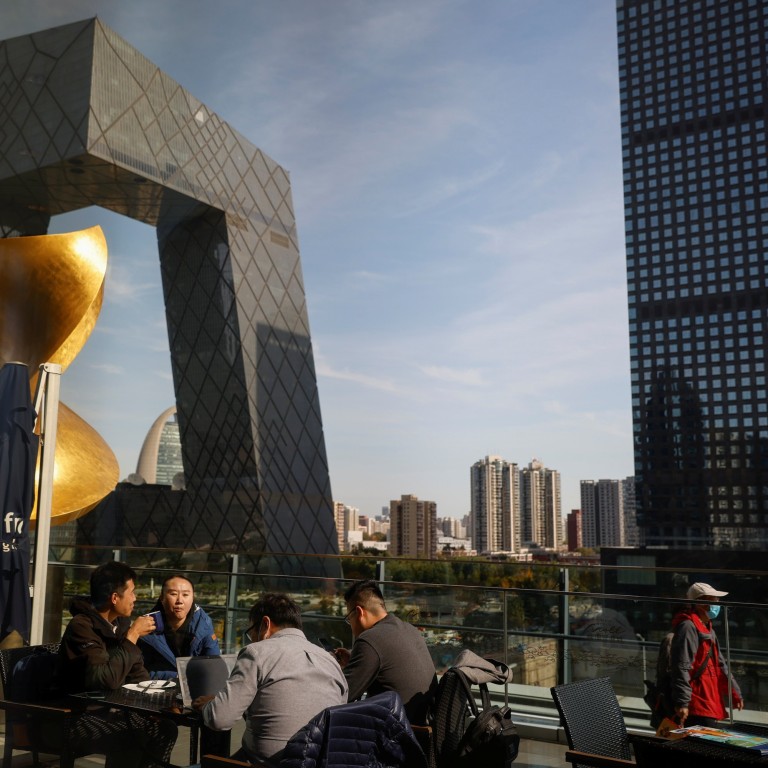
China’s commercial real estate market expected to pick up in mid-2023, with more investment on the way
- Demand in tier-one cities like Beijing and Shanghai should recover from a slight decline during the pandemic
- Vacancy rate in Beijing will, however, climb to 20 per cent as a large slew of pent-up supply comes online, Colliers analyst predicts
Demand in tier-one cities like Beijing and Shanghai should recover from a slight decline during the pandemic, though interest in lower-tier cities may continue to wane.
In the Chinese capital, the vacancy rate of premium, or Grade A, offices rose 1 percentage point to 16 per cent in 2022, while monthly rent slipped 1.7 percentage point to 331.1 yuan per square meter, according to data from global real estate firm Colliers.
The vacancy rate for Beijing’s Grade B office market climbed 3.7 percentage points from a year ago to 15.6 per cent in 2022. Average rents dropped 5.6 per cent year on year.
He expects “economic vitality to be restored” starting from the second quarter.
While he believes demand will rebound in 2023, he expects the vacancy rate in Beijing will inevitably climb to 20 per cent as a large slew of pent-up supply comes online. Over 640,000 square metres of space will be added to the market next year as delayed projects finally come to fruition.
Winter Yan, deputy director of capital markets and investment services for North China at Colliers, said foreign investment in China’s commercial property had declined since the pandemic began.
Only two out of nine deals in Beijing in the fourth quarter of 2022 were made by foreign investors.
In October, CapitaLand, from Singapore, acquired Borui Plaza in downtown Beijing for 2 billion yuan – a 30 per cent discount. This month, AIA Life acquired a 90 per cent stake in Shanghai Shisen Real Estate for 5 billion yuan.
“We hope that with the easing of Covid-19 measures, foreign investors will return to the Beijing market,” said Yan.
The deal shows foreign investors are more drawn to commercial properties in tier-one cities, said Gordon Liu, managing director of capital markets of China at Cushman & Wakefield.
According to a report by Cushman & Wakefield on December 21, investors’ appetite for office assets in Beijing and Shanghai was particularly strong. Economic uncertainty and the tightening of rules governing financing in the real estate market in recent years have made investors risk-averse and likely to choose more stable markets in tier-one cities as investment destinations.
The survey found more than 80 per cent of investors would consider investing in Grade A offices in Beijing, while over 50 per cent of showed an interest in Shanghai office properties. Only 8 per cent of respondents indicated an interest in offices in big tier-two cities.
Liu expects China’s commercial property market to “get a boost” for three reasons: The Central Economic Work Conference has defined it as a “pillar” industry of vital importance to the economy, the government plans to expand a real estate investment trusts pilot programme to include commercial property, and the country is scrapping its travel restrictions.
Investor demand for retail and hotel properties is expected to pick up in 2023, according to the report.
A case in point is Swire Properties, which owns six malls in China, including Taikoo Li in Beijing and Taikoo Li Qiantan in Shanghai.
Han Zhi, director of retail at Swire Properties, said the company has allocated HK$50 billion (US$6.4 billion) to “expand our Taikoo Li and Taikoo Hui brands” in China in the next 10 years.
“We maintain a positive outlook and remain confident that the scale of potential retail consumption will continue to attract major brands to invest in this important market,” he said.
As of September, occupancy rates at Swire’s malls in China had stayed at 95 per cent or above, defying sporadic Covid-19 outbreaks.
“The overall performance has recovered gradually in recent months in terms of both footfall and retail sales, as the government’s pandemic control measures have been progressively relaxed,” said Han.


